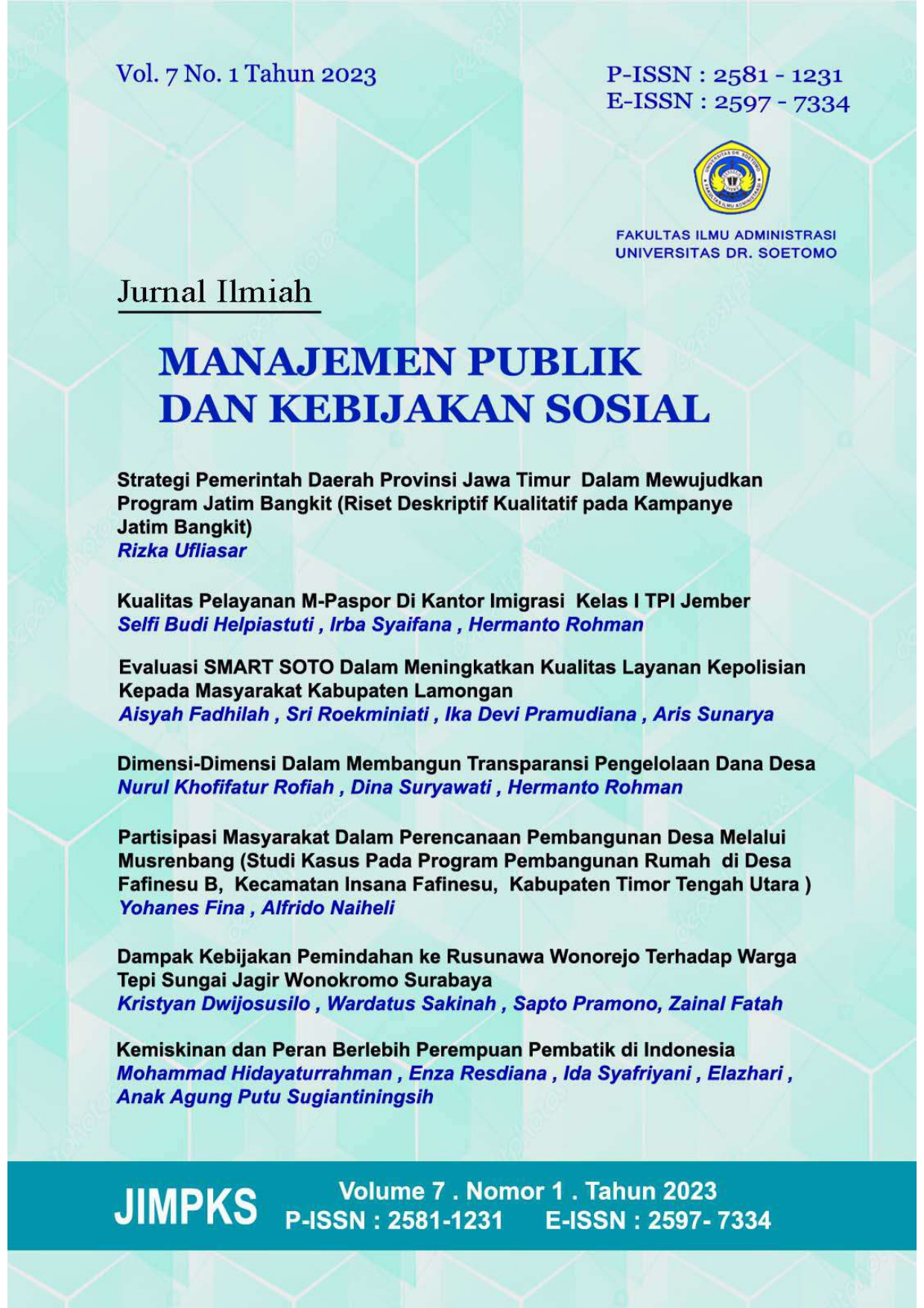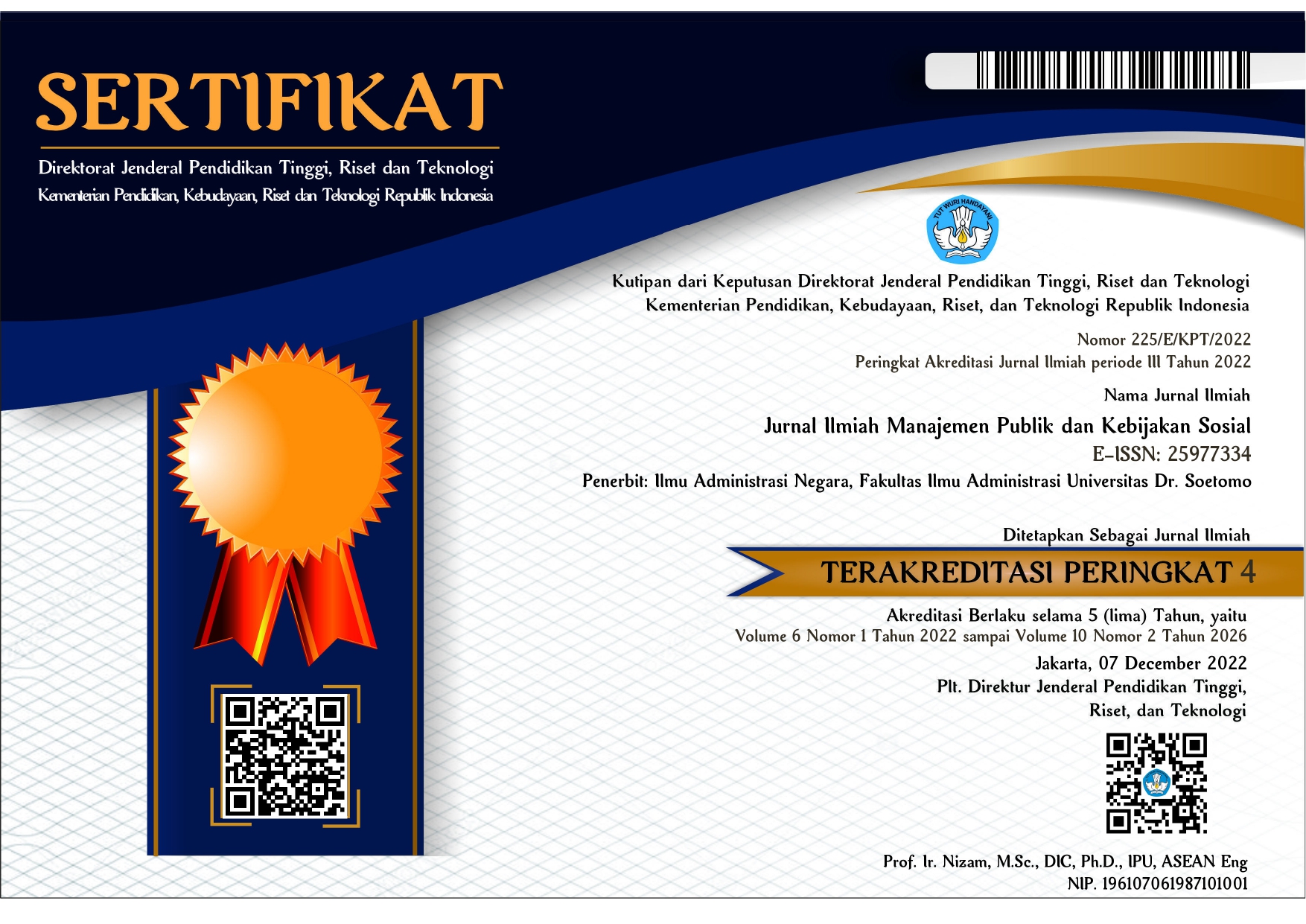Kualitas Pelayanan M-Paspor Di Kantor Imigrasi Kelas I TPI Jember
 Abstract views: 1141
,
Abstract views: 1141
,
 PDF (Bahasa Indonesia) downloads: 2201
PDF (Bahasa Indonesia) downloads: 2201
Abstract
This article aims to describe and analyze the service quality of the M-PASPOR application at the Class I Immigration Office TPI Jember. M-PASPOR was launched in an effort to improve the quality of passport application services, which were previously done manually. This application can be accessed anywhere and anytime by the public to apply for a new passport or change of passport. The service quality measurement method uses the Egovqual theory with four quality dimensions (efficiency, trust, reliability, and citizen support). This study uses a descriptive quantitative approach. Sampling in this study used an accidental sampling technique and obtained a total of 97 samples. The sample identification criteria are people who have used the M-PASPOR application. The data collection technique used in this study was the distribution of questionnaires. Validity and reliability testing were used in this study using SPSS 25. The analysis of the data used in the study is the GAP calculation by assessing the difference in perceptions and expectations of the community using the M-PASPOR application, followed by Importance Performance Analysis (IPA). Based on the results of the gap analysis, the service quality of the M-PASPOR application is in the not good category with a total score of -0.335. Based on the results of the IPA, there are several items that fall into categories that require improvement. These items are regarding form filling instructions, electronic media to access M-PASPOR, information in the M-PASPOR application, timeliness of service through M-PASPOR, speed of accessing applications, and username and password security in the M-PASPOR application.
References
de Jesus Henriques Silva, F., & Fernandes, P. O. (2011). Importance-performance analysis as a tool in evaluating higher education service quality: The empirical results Of estig (IPB). Creating Global Competitive Economies: A 360-Degree Approach - Proceedings of the 17th International Business Information Management Association Conference, IBIMA 2011, 4.
Fandy Tjiptono. (2005). Prinsip - Prinsip Total Quality Service ( TQS ). Yogyakarta: Andi.
Henry, Nicholas; Lontoh, Luciana D; Public administration and public affairs. (1988). Administrasi negara dan masalah-masalah kenegaraan/Nicholas Henry; diterjemahkan oleh Luciana D. Lontoh. Jakarta: Rajawali.
Indrajit, R. E. (2005). Ragam Kasus Implementasi Sukses di Berbagai Belahan Dunia. Andi Offset .
Maryam, N. S. (2016). Mewujudkan Good Governance Melalui Pelayanan Publik. Jurnal Ilmu Politik Dan Komunikasi.
Nautami, D. T., Wahid, F., Informatika, M. T., Fakultas, P., Industri, T., Islam, U., & Yogyakarta, I. (2019). Penerapan Metode E-Govqual Untuk Mengevaluasi Kualitas Layanan Aplikasi E-Filing oleh Wajib Pajak. Prosiding Seminar Nasional Geotik.
Papadomichelaki, X., & Mentzas, G. (2012). E-GovQual: A multiple-item scale for assessing e-government service quality. Government Information Quarterly, 29(1), 98–109. https://doi.org/10.1016/j.giq.2011.08.011
Suaedi, F., & Wardiyanto, B. (2010). Revitalisasi administrasi negara: reformasi birokrasi dan e-governance. In Yogyakarta: Graha Ilmu.
Sugiyono. (2018). Prof. Dr. Sugiyono. 2018. Metode Penelitian Kuantitatif, Kualitatif, dan R&D. Bandung: Alfabeta. Prof. Dr. Sugiyono. 2018. Metode Penelitian Kuantitatif, Kualitatif, Dan R&D. Bandung: Alfabeta.
Undang Undang No. 6 Tahun 2011 tentang Keimigrasian. (n.d.). Undang Undang No. 6 Tahun 2011 tentang Keimigrasian.
Copyright (c) 2023 Selfi Budi Helpiastuti, Irba Syaifana, Hermanto Rohman

This work is licensed under a Creative Commons Attribution-ShareAlike 4.0 International License.
Authors who publish with JIMPKS: Jurnal Ilmiah Manajemen Publik dan Kebijakan Sosial agree to the following terms:
-
Authors retain copyright and grant the journal right of first publication with the work simultaneously licensed under a Creative Commons Attribution License (CC BY-SA 4.0) that allows others to share the work with an acknowledgment of the work's authorship and initial publication in this journal.
-
Authors are able to enter into separate, additional contractual arrangements for the non-exclusive distribution of the journal's published version of the work (e.g., post it to an institutional repository or publish it in a book), with an acknowledgment of its initial publication in this journal.
-
Authors are permitted and encouraged to post their work online (e.g., in institutional repositories or on their website) prior to and during the submission process, as it can lead to productive exchanges, as well as earlier and greater citation of published work.










